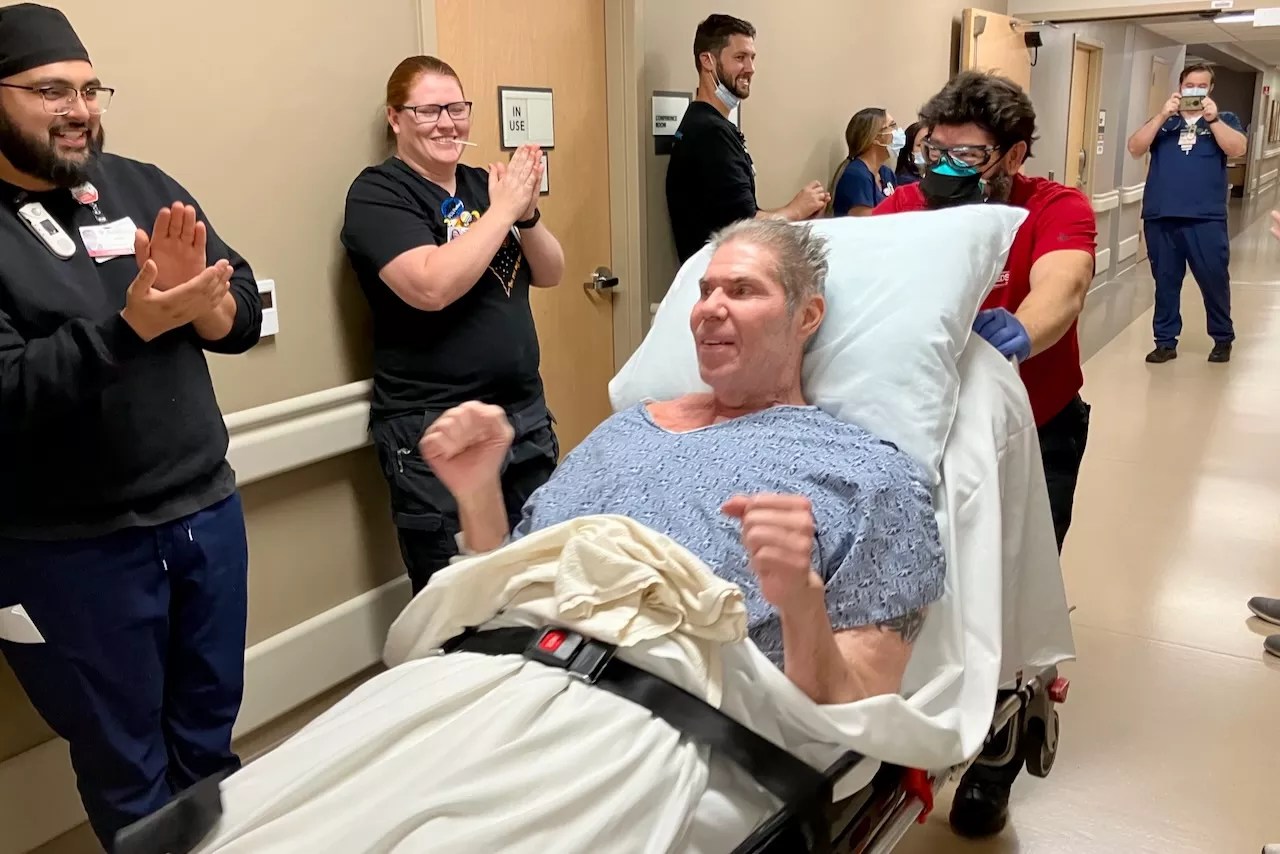
Courtesy Banner University Medical Center

Audio By Carbonatix
Steve Ekdahl, a 68-year-old Prescott resident, was having a perfectly mundane afternoon on Dec. 21, 2022. One moment, he was brushing his teeth; the next, his wife found him unconscious on the bathroom floor.
After a 911 call, CPR and an electric shock from the paramedics’ defibrillator, Ekdahl was transported to a nearby emergency room. There he was intubated and brought to the cardiovascular intensive care unit. Ekdahl survived, and soon he was transported to Banner – University Medical Center in Phoenix.
Here Ekdahl discovered he needed a heart transplant. Though he’d eventually become the recipient of Banner’s 100th successful heart transplant, Ekdahl would require a cutting-edge medical device to keep him alive until a compatible donor heart became available.
University Medical Center’s Advanced Heart Failure Program specializes in bridging patients to transplant using short- and long-term mechanical circulatory support devices. It’s one of these devices – called a total artificial heart, or TAH – that sustained Ekdahl for the next nine months. University Medical Center is the only medical facility in Arizona that performs TAH procedures.
In October 2023, Ekdahl, who had a weak heart and atrial fibrillation before his collapse, became eligible for a heart transplant from an organ donor. His procedure was the program’s 100th successful heart transplant since its launch in February 2020. As of late last year, Banner’s post-heart transplant survival rate after one year is 95%.
“Performing 100 successful transplants with a survival rate above the national average is no small task in four short years,” Dr. Radha Gopalan, medical director for the Advanced Heart Failure Program and a member of Ekdahl’s transplant team, told Phoenix New Times in an email. “I am very proud and thankful of our 40-plus members and growing team. Their dedication, collaboration, compassion and team spirit have made it possible for us to be successful.”
A transplant such as Ekdahl’s takes anywhere from four to nine hours of active operating time, according to Gopalan. This bumps up to seven to 15 hours for dual-organ transplants, which make up some of University Medical Center’s transplant count. After the procedure, a transplant patient’s medical team focuses on signs of rejection, in which the patient’s immune system fights against the new organ.
Gopalan said the team employs multiple strategies aimed at detecting rejection in the months following a heart transplant. While blood tests and ultrasound imaging allow the program to monitor a patient’s well-being immediately after the procedure, biopsies, further blood tests and even telehealth visits help doctors keep an eye out for negative reactions throughout the first year.
Ekdahl said his post-procedure recovery was surprisingly fast. But because he was bedridden from December 2022 until a few weeks after surgery, his muscles atrophied, making it difficult for him to walk straight. He’s working daily to strengthen his legs, back and arms, which he says is a “slow process.”
“I am determined to get stronger, and I am not going to let anybody down,” he told New Times in an email.
Now at home, Ekdahl is excited to get back to the nitty-gritty of everyday life. While some of the activities he enjoys are still off-limits, he’s grateful he was able to change the battery on his wife’s watch, and he has returned to certain exercises on his universal gym.
“With their remarkable talent, expertise and unwavering dedication, the heart transplant team became the architects of my new beginning,” Ekdahl said. “Their brilliance, compassion and tireless efforts not only saved my life but also restored my hope for the future.”